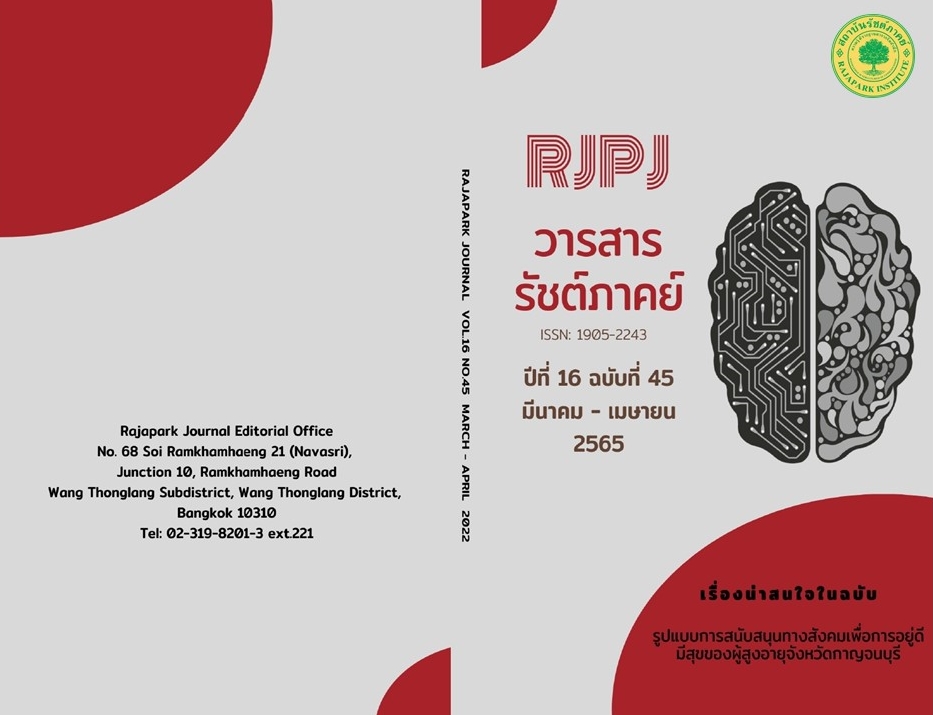Guidelines for the Development of Teaching Citizenship: Concepts and Skills of Citizens in the New Normal
Main Article Content
Abstract
The purposes of this research were to study the concepts and skills of citizen development in the New Normal era and examine the guidelines for developing the teaching of a civic course in the general education program. The research target group is academics in civic development and learners in citizenship courses at Srinakharinwirot University. This qualitative research applied documentary research, in-depth interviews with the experts in the development of citizen courses at the higher education level and focus groups to examine the concepts of citizenship. The research results showed that the concepts and skills in developing a citizen required the integration of life skills, higher-order thinking skills, information technology, communication skills, and collaborative learning in the community. Moreover, the development of young active citizens in the general education program should be promoted with instructional learning that suited the learner’s context. Further, the knowledge, in terms of concept that constructs the awareness of universal value should be enhanced to develop life skills and develop learners to tackle challenges in the future.
Article Details

This work is licensed under a Creative Commons Attribution-NonCommercial-NoDerivatives 4.0 International License.
Views and opinions appearing in the Journal it is the responsibility of the author of the article, and does not constitute the view and responsibility of the editorial team.
References
Anderson, O. W., & Krathwohl, D. R. (2001). A Taxonomy for Learning, Teaching, and Assessing: A Revision of Bloom’s Taxonomy of Educational Objectives. New York: Longman.
Bastedo, M. (2002). General Education. In J. J. F. Forest & K. Kinser (Eds.), Higher Education in the United States: An Encyclopedia (pp. 273-276). Santa Barbara, CA: ABC-CLIO.
Bunjongparu, N. (2018). The Development of General Education Curriculum to Promote 21st Century Citizenship Skills. Srinakharinwirot Research and Development (Journal of Humanities and Social Sciences), 10(20), 70-84.
Choi, M. (2016). A Concept Analysis of Digital Citizenship for Democratic Citizenship Education in the Internet Age. Theory & Research in Social Education, 44(4), 565-607.
Fakhri, L. S., & Talebzadeh, F. (2011). A Framework for Professional Citizenship Education Based on Knowledge Management Principles. Procedia - Social and Behavioral Sciences, 29, 1133–1142.
Helen, H., & Vidur, C. (2020). The Futures of Education for Participation in 2050: Educating for Managing Uncertainty and Ambiguity. UNECSO. Retrieved March 4, 2022, from https://unesdoc.unesco.org/ark:/48223/pf0000374441
Hew, K. F., Jia, C., Gonda, D. E., & Bai, S. (2020). Transitioning to the “New Normal” of Learning in Unpredictable Times: Pedagogical Practices and Learning Performance in Fully Online Flipped Classrooms. International Journal of Educational Technology in Higher Education, 17(1), 1-22.
Hirsh-Pasek, K., Hadani, H. S., Blinkoff, E., & Golinkoff, R. M. (2020). A New Path to Education Reform: Playful Learning Promotes 21st Century Skills in School and Beyond. Policy Brief.
Kerr, D. (1999). Citizenship Education in the Curriculum: An International Review. School Field, 10(3/4), 5-32.
Lutaj, L. (2021). The Role of University on the Civic Preparation of the Youth. European Journal of Social Science Education and Research, 8(3), 15-22.
Marope, P. M. (2017). Reconceptualizing and Repositioning Curriculum in the 21st century: A Global Paradigm Shift. Geneva: UNESCO IBE.
Mathuros, S. (2021). Management Education Online in the NEW NORMAL COVID-19. Rajapark Journal, 15(40), 33-42.
McKinsey Global Institute. (2018). Skill Shift Automation and The Future of The Workforce. McKinsey & Company.
Organization for Economic Co-operation and Development [OECD]. (2019). OECD Learning Compass 2030. Paris: OECD.
Pacheco, J. A. (2020). The ‘New Normal’ in Education. Prospects. Retrieved December 4, 2021, from https://link.springer.com/article/10.1007/s11125-020-09521-x
Protect Education in Insecurity and Conflict. (2013). Protect Education in Insecurity and Conflict. Qatar Foundation Publishing Center.
Royal Society of Thailand. (2015). Encyclopedia of Psychology. Bangkok: Office of the Royal Society.
Rüfenacht, S. et al. (2021) Communication and Dissemination in Citizen Science. In Vohland, K. et al. (eds) The Science of Citizen Science. New York: Springer Publishing.
Sinclair, R. (2004). Participation in Practice: Making it Meaningful, Effective and Sustainable. Children & society, 18(2), 106-118.
Tanoamchard, W., Unphim, U., & Joungtrakul, J. (2020). Presentation of Qualitative Research Findings. NRRU Community Research Journal, 14(4), 1-13.
UNESCO. (2017). Preventing Violent Extremism Though Education – A Guide for Policy Makers. Paris: UNESCO Education Sector.
United Nations. (2013). A New Global Partnership: Eradicate Poverty and Transform Economies Through Sustainable Development. The Report of the High-Level Panel of Eminent Persons on the Post-2015 Development Agenda. New York: United Nations.
United Nations Children's Fund. (2017). Analytical Mapping of Life Skills and Citizenship Education in Middle East and North Africa. UNICEF Regional Office.
Wanitchayaporn, S. (2021). Developing Digital Skills and Working in a New Normal. The 13th NPRU Conference, (Pp.2033-2042). Nakhon Pathom: Nakhon Pathom Rajabhat University.
Winthrop, R. (2020). The Need for Civic Education in 21st Century Schools. Washington, DC: Brookings Institute.


